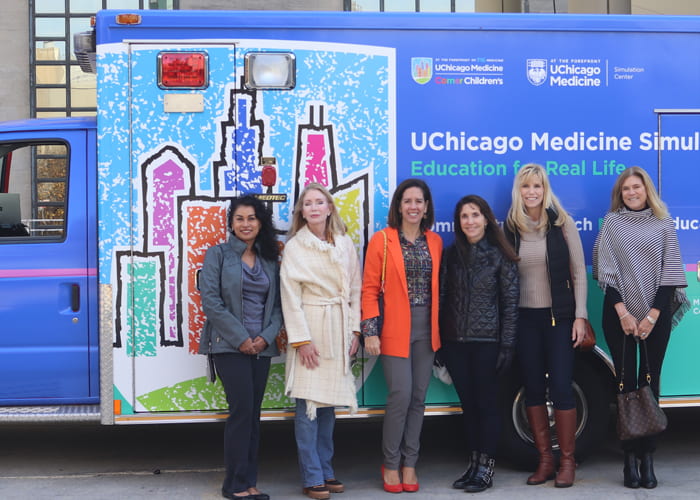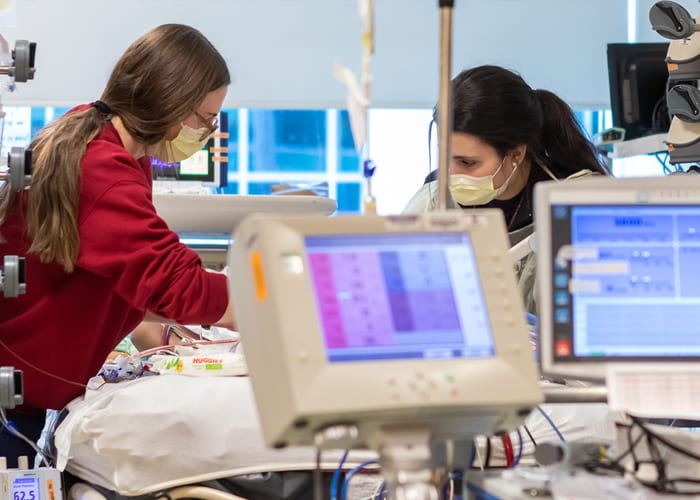
This is Comer Children’s care
Healing comes in many forms, from leading-edge technologies and translational research to innovative therapies and services. Here, you’ll find a few of the ways we provide the best care possible for our kids.

Level 1 trauma center
For over 35 years, Comer Children’s has provided outstanding care for critically injured children from the Chicagoland area, as well as transfer patients from all across Illinois and northern Indiana. Our teams are continually advancing their expertise, in addition to providing injury prevention and violence recovery programs, community outreach and advocacy work.
Our Pediatric Violence Recovery Program is one of only a handful of such programs in the country. Our team of child life specialists, including Geri Pettis, Pediatric Violence Recovery Specialist, and Bradley Stolbach, PhD, Pediatric Trauma Psychologist, are doing vital and transformative work in this nascent field. Recently, the team served as co-directors/co-hosts of a citywide firearm violence symposium, Keeping Youth Safe: Public Health Approaches to Ending Gun Violence.
Simulation learning & community education
Medical simulation can be a powerful tool for education, assessment and research. In fact, simulation has been shown to improve the clinical knowledge and skills of individuals and teams. At Comer Children’s, we apply the principles behind the most up-to-date adult-learning theories across a variety of simulation-based methodologies. Using deliberate and repeated practice, in conjunction with debriefing techniques, our teams sharpen their skills and expand their practices.
The Simulation Center aims to improve the quality of care and patient safety. As part of the commitment to providing quality pediatric care at Comer Children’s, UChicago Medicine supports a robust simulation training program across a variety of simulation modalities, including our main simulation lab, our simulation mobile unit and the simulation lab in our Pediatric Intensive Care Unit.


Advanced neonatal care
For babies affected by high-risk pregnancy conditions or complications, our specialists offer all pre- and postnatal diagnostic tests and treatments, as well as consultations from surgical and pediatric subspecialists.
The Margaret M. and George A. Stephen Neonatal Intensive Care Unit (NICU) at Comer Children’s is among the largest in the Midwest, with approximately 1,000 admissions every year. Our NICU features 47 designated tertiary care beds (Level III) and 18 convalescent (Level II) beds. Extracorporeal membrane oxygenation (ECMO) can be provided for up to three infants at a time by a special group of ECMO specialists who supplement the NICU nursing staff.
THE COMER CARE DIFFERENCE
Child Life & Family Education
Child life specialists use their expert knowledge of infant, child and adolescent development to assess and support the emotional health and well-being of families. Focusing on each child’s psychological and developmental needs, our team provides evidence-based interventions, including therapeutic play, preparation for procedures and education, that support and reduce fear, anxiety and pain for children, adolescents and families, inpatient and outpatient. Learn more>
Hecktman Music Therapy Program
Board-certified music therapists lead interactive music sessions with patients that include playing the child’s favorite songs, teaching them how to play an instrument, and providing a friendly face and a listening ear for each child in need. Music therapy can serve as a distraction from the hospital environment and offers children the opportunity to express themselves, as well as their fears and concerns, in a safe and supportive setting.
Chicagoland Children’s Health Alliance (CCHA)
CCHA is a collaboration between Comer Children’s, Advocate Children’s, and the NorthShore University HealthSystem. CCHA serves patients and their families in five main areas: cancer and blood diseases, cardiology and cardiac surgery, gastroenterology, general surgical care, and neurosciences. Learn more>
Center of Excellence in Pediatric Sedation
The Pediatric Sedation and Vascular Access department has been designated a Center of Excellence in Pediatric Sedation, while seeing tremendous growth over the last few years. In 2018, the team placed 472 ultrasound guided lines. Today, that number has increased to well over 1,000. Staffed exclusively by specialists in pediatric critical care medicine, the pediatric sedation service at Comer Children’s is a Platinum Institutional Member of the Society for Pediatric Sedation with access to the Pediatric Sedation Research Consortium. The department is exploring a number of cutting-edge interventions, including virtual reality patient simulation and procedural nitrous oxide administration.
Shirley Ryan AbilityLab
Through our affiliation with Shirley Ryan AbilityLab, Comer Children’s patients have access to on-site physiatry consultations focused on identifying interventions to promote the highest level of functional ability for each patient.
Expressive Therapies
We offer children the opportunity to express themselves, as well as their fears and concerns, in a safe and supportive environment. We have a variety of special therapeutic programs to allow for self-expression, including art therapy, closed-circuit TV, cooking, medical bingo and pet therapy. Learn more>
Pediatric Critical Care Center (PCCC)
Comer Children’s has been designated a PCCC by the Illinois Department of Public Health Emergency Services for Children Facility Recognition program. The PCCC designation from the Illinois Department of Public Health (IDPH) recognizes that Comer Children’s has the necessary resources, personnel and quality infrastructure in place to meet the emergency and critical care needs of seriously ill and injured children.
PCCC is the highest-level designation awarded within this program. Learn more>
Healing garden
The healing garden is a family-centered play space that features art spaces, musical instruments and a “pond” made to create the visualization of water. The space was designed to capture elements of nature that would engage children and create an atmosphere of outdoor tranquillity where families can enjoy peaceful moments while at the hospital.
